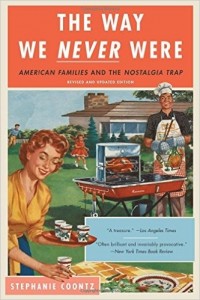 The latest edition of Stephanie Coontz’s The Way We Never Were: American Families and the Nostalgia Trap is an essential read for policymakers. Coontz lays bare, in engaging, easy-to-read prose, the fact that many of Americans long-held beliefs about marriage, family structure, gender relations, caregiving, and child rearing are myths—amalgamations of narratives about families from different periods in American history that are rife with blind spots and errors. And, as Coontz makes clear, policymakers’ adherence to these false ideals has profound, often deeply negative consequences for American families.
The latest edition of Stephanie Coontz’s The Way We Never Were: American Families and the Nostalgia Trap is an essential read for policymakers. Coontz lays bare, in engaging, easy-to-read prose, the fact that many of Americans long-held beliefs about marriage, family structure, gender relations, caregiving, and child rearing are myths—amalgamations of narratives about families from different periods in American history that are rife with blind spots and errors. And, as Coontz makes clear, policymakers’ adherence to these false ideals has profound, often deeply negative consequences for American families.
This myth busting is part of what makes Coontz’s newest release so important. Family is so ubiquitous, so personal, that everyone fancies themselves an expert. The fact that Coontz reveals one surprise after another on this intimate and familiar terrain shows that such thinking is just that: fanciful. Many policymakers would be astonished to learn, as Coontz informs us, that nearly three in ten American households contain just one person; that premarital cohabitation does not increase the risk of divorce; and that modern working and single mothers today spend more time with their children than stay-at-home, married mothers did 50 years ago.
A nuanced discussion of the economic and social contexts in which families form, live, and work—and the centrality of public policy in shaping these contexts—is the second reason Coontz’s book is a must read for policymakers. Coontz, a historian, carefully assembles rigorous and persuasive research to explain how income inequality, which has been driven to historic heights in recent years by decades of ill-advised policy choices, is a much stronger predictor of poverty than family structure.
Coontz’s work clearly demonstrates that there is much room for improvement in the ways policymakers understand, regulate, and try to influence families. There is a push in Washington for evidence-based policymaking. Yet all too often family policy is an area where, even when we possess the kind of coherent evidence Coontz offers, policy is rooted in those myths rather than what has been empirically observed or tested. Efforts to undermine marriage equality, reduce women’s access to reproductive health services, and teach abstinence-only sex education are all examples of policies that are purportedly designed with the best interests of children and families in mind—yet in reality these policies fly in the face of research about what families need to be strong, stable, and secure. Such policymaking is illogical at best and harmful at worst.
Fortunately for policymakers Coontz’s book makes for an absorbing, sometimes shocking, often wryly funny read. Both comprehensive and comprehensible, it’s a veritable one-stop shop for reliable research on how public policy and culture affect families. Readers will feel as if they have been whisked away on a tour of history and academia with an expert guide imparting the most relevant and compelling facts at each stop. Policymakers would be smart to buy a ticket.
 Katherine Gallagher Robbins (@kfgrobbins) is the Director of Family Policy for the Poverty to Prosperity Program at the Center for American Progress (CAP). Before joining CAP, Robbins was the director of research and policy analysis at the National Women’s Law Center. Robbins holds a bachelor’s degree in government from the College of William and Mary and a doctorate in political science from the University of Michigan, Ann Arbor.
Katherine Gallagher Robbins (@kfgrobbins) is the Director of Family Policy for the Poverty to Prosperity Program at the Center for American Progress (CAP). Before joining CAP, Robbins was the director of research and policy analysis at the National Women’s Law Center. Robbins holds a bachelor’s degree in government from the College of William and Mary and a doctorate in political science from the University of Michigan, Ann Arbor.

Comments